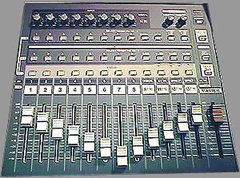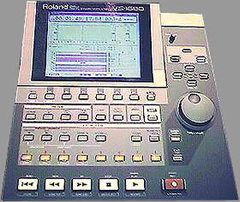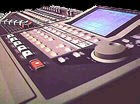| INTRODUCTION |
 |
 |
VS-1680
focused the Roland philosophy of manufacturing compact and fully
equipped portable systems.
It is a digital recording system conceived for multitrack recording
and post audio production applications.
The system includes a 16 tracks recorder, two independent mixers
dedicated to input sources and to recorded tracks mixing, two processor
boards including 4 simultaneous effects, internal Hard Disk and
SCSI interface for external units and CD mastering units.
All this is included in a very small and easy to carry structure.
The VS-1680 is equipped with all easiness and quality features typical
of the previous model VS-880. The operative system is stored into
flash RAM and it's easy upgradable.
The VS-1880 is equipped with 24-bit A-D/D-A converters and it allows
to simultaneously playback up to 18 tracks. Moreover, it provides
a new CD Writing function for a direct CD multitrack recording
 Technical
Details Technical
Details
 Bundled
Software Bundled
Software
 VS-1880
Additional Features VS-1880
Additional Features
|
| MAIN
PLUS |
 |
 |
Both
the VS-1680 and the VS-1880 (as the previous VS-880 model) are very
compact and consequently they are very easy to carry, providing respectively
a real 16 and 18 tracks portable recording studios: 55 x 35 x 10 cm.
dimensions and 7 kg. weight.
Due to the fact that the machines are working completely in the digital
domain, all mixing parameters can be stored in scenes memories (8
for each song) that can be immediately and easily recalled at any
time.
Moreover, the on-board Automix section allows to store the fader,
pan, Aux send, effect control settings in synchronization with the
recorded audio events.
The mixing parameters can be also remotely controlled through continuous
controllers or SysEx MIDI messages sent by computer and MIDI software.
Audio quality is adequate to the declared specs: 20-bit A/D converters
in the VS-1680 and 24-bit A/D converters in the VS-1880. 24-bit internal
signal processing for both units. |
 |
 |
The
VS-1680 recorder can work both with 8 linear-data tracks or with 16
compressed-data tracks (18 tracks in the VS-1880): data can be recorded
in various coding modalities in order to optimize Hard Disk capacity.
Anyway R-DAC technology, patented by Roland, assures an extremely
satisfying response.
Roland declares that the Multitrack Pro mode (2:1 data compression
ratio) assures the same recording quality of other 24-bit linear systems.
Recording operation includes all the typical advantages of the random
access HDR technology. For example, the traditional rewinding time
of traditionals tape recorders is replaced by almost immediate location
functions: 64 locations and 1000 Markers can be set in each song.
Loop and Auto-Punch functions are extremely useful in order to assure
absolute precision while working on small lenght audio sections.
Each real track includes 16 virtual tracks. This is useful, for instance,
to record various takes and to choose the best performance later.
One or two optional Effect boards can be installed providing respectively
2 or 4 signal processors, able to be used in both recording and mixing
sessions. Effect processors can be assigned to all channels independently,
to Stereo Bus or to Aux/Effects send.
In order to complete a full music production in digital domain, an
optional CD-RW unit can be connected to VS-1680/VS-1880 assuring also
digital mastering facilities.
Alternatively, the built-in S/PDIF digital outputs allow the mixdown
by using DAT or other external digital recorders. |
| ARCHITECTURE |
 |
 |
The
VS-880 drawbacks (small and not-backlit display, complexity in operation,
etc.) have been solved in both the VS-1680 and the VS-1880.
The display, based on a graphic icons system, is wide, backlit and
invaluable in giving information about mixer and recorder status.
For instance, channel-track assignments have been greatly simplified:
by using specific keys, the assigned sources are both displayed on
the screen and shown by the coloured LED on the panel.
This feature makes easier external sources recording and pre-recorded
tracks bouncing. |
| CONCLUSIONS |
 |
| |
At
the first approach, VS-1680 stands out as compact and flexible recording
system.
The increased number of tracks of the VS-1880 (18) allows a more flexible
management of the mastering functions that are now summarized in a
dedicated page.
Some limits to point out regarsd the wave shape display (still not
satisfactory for complex editing operations) and the lack of moving
faders.
Anyway, have to be considered that the VS-1680 target consists in
offering an hi-quality compact and portable recording system at a
very good quality/price ratio. |
|
 |



